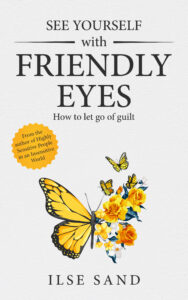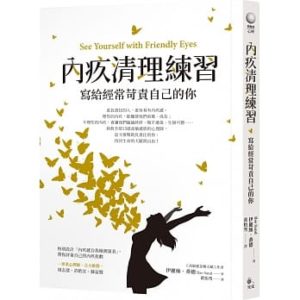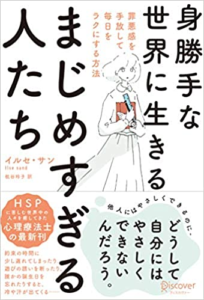The Book is released in English, Danish, French, Japanese, Russian, Korean, Czech, Simplified Chinese, Turkish and Complex Chinese. During 2024 the book will also be published in Vietnamese.
 The English edition
The English edition
Publisher: Ammentorp
April 2023
Order here
 The Taiwanese edition
The Taiwanese edition
Publisher: Athena Press
Autumn 2020
Order here
 The Japanese edition
The Japanese edition
Publisher: Discover 21.
Autumn 2020.
Order here
 The Danish edition
The Danish edition

Publisher: Gyldendal
Title: Venlige øjne på dig selv
– Slip dårlig samvittighed
March 2020
Order here
 The French edition
The French edition

Publisher: Guy Trédaniel.
Title: Hypersensibles, de la culpabilité à la bienveillance
September, 2020
Order here
 The Russian edition
The Russian edition

Title: С любовью к себе. Как избавиться от чувства вины и обрести гармонию
Publisher: Alpina Publisher
February 2021
Order here
 The Czech edition
The Czech edition
Publisher: Portal
Title: Podívejte se na sebe laskavě – Jak se osvobodit od přehnané viny
Autumn 2021
Buy the Book
 The Korean edition
The Korean edition

Publisher: DAEWON C.I INC
Spring 2022
Order here
Turkish edition

Publisher: Sola Unitas Academy
2024
Order the book
 The Simplified Chinese edition
The Simplified Chinese edition
Publisher: Beijing Sunnbook Culture & Art Co., Ltd
2022
The following editions are on the way but have not yet been released
 The Vietnamese edition
The Vietnamese edition
Publisher: Nha nam publishing and communications jsc
More information will follow.
About the book
Figuratively speaking, it can be said that the conscience is where you evaluate yourself. You’re
probably reading this book because occasionally you judge yourself harshly.
A self-evaluation can be realistic, but often it’s influenced by many factors that can make it
much too negative.
It’s good to be able to feel guilt and have a bad conscience. It shows that you’re a responsible
person who cares about contributing positively to your own life as well as the lives of others.
You’re probably not conscientious in every aspect of life. Some people are serious about
being environmentally responsible, while others take on a lot of responsibility for solving practical
problems. This book is primarily about the responsibility we take in relationships.
Some people are quick to take responsibility for bad vibes, for example, or for someone not doing
well or feeling hurt, and they burden themselves with exaggerated guilt. Others rarely or never see
themselves as being guilty of anything negative.
Most of us are somewhere in between these two poles. But we can swing a bit back and
forth in our lives. We can have good days or long periods of time where we see ourselves and our
lives in a positive light. Then bad days come along, when we overburden ourselves with criticism
and a bad conscience, and feel we don’t measure up.
When I was a priest, I listened for many years to people weighed down with guilt or a bad
conscience. Since then, as a psychotherapist I’ve had the opportunity to help people examine their
emotions on a deeper psychological level.
In addition, I’ve experienced how much more energetic I felt after realizing that some of the guilty conscience I carried around was unrealistic or exaggerated. More about that in the introduction.
In this book you’ll find a number of tools for cleaning up your bad conscience and for training to
see yourself with a friendly eye. Among other things, it describes how you can make changes in the
principles and rules you’ve formed in your life; get rid of guilt that belongs to others; make friends
with your fear; and let go of struggles that exhaust you. And how you can find strength in
acknowledging guilt that is yours, sharing it with others if that’s relevant – and forgiving yourself.
The first chapter of the book explains what a bad conscience is, and it also gets into how self-
criticism can sometimes be used in a positive manner, while at other times it’s just a bad habit.
Three chapters are about a lack of responsibility. It’s likely that one or more of your closest
friends or family members shun the blame when something bad happens. If you easily develop a
bad conscience, you’re a prime target for people who want to unload their guilt and responsibility.
That’s why it’s important to be aware of the mechanisms involved and how to protect yourself.
At the end of each chapter you will find exercises to help you understand your feelings of guilt or
inadequacy, so you better can distinguish between which of the feelings are rational and which are
out of proportion.
In the back is an overview of the book’s tools, along with a test to measure your tendency to form
a guilty conscience.




